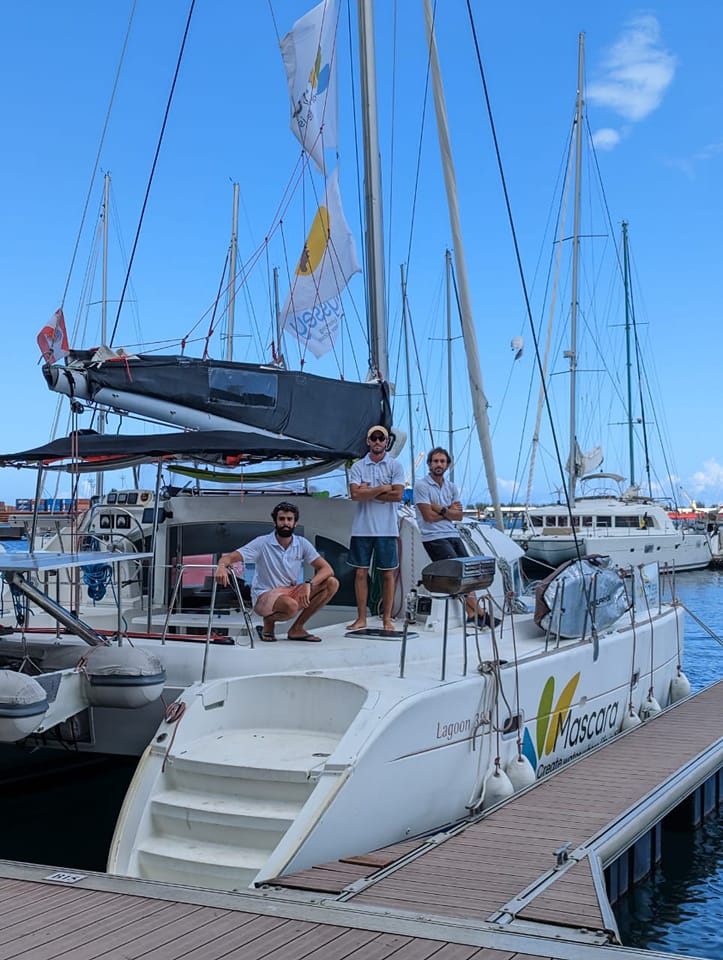Technology campaigners set sail for the Cook Islands
Wednesday 10 May 2023 | Written by Al Williams | Published in Features, Weekend

Martin Bourillet, project manager, pictured right, and his crew aboard the Kori Odyssey, captain Manu Jacolot, left, and logistic manager Baptiste Pouder, centre. 23050217
A massive water access project is coming to the Cook Islands – by sail.
Martin Bourillet and his crew of two are aboard 38-foot catamaran Kori Odyssey on a 12-month voyage around the Pacific and are set to dock in Rarotonga this week.
Bourillet, a graduate in engineering and business specialising in environment, water and energy, along with his crew are working for OSMOSUN, a French company which specialises in water treatment using renewable energy.
Departing from Papeete in French Polynesia, in January, the Kori Odyssey crew will sail across 15,000 kilometres to meet water stakeholders of the Pacific Ocean.
“We are working in sustainable and ecofriendly water access projects in the Pacific,” he said.
“We are currently implementing a new innovative approach with the Kori Odyssey; this consists in sailing all around the Pacific to meet the stakeholders of the water sector, and help build with the community sustainable, eco-friendly and long term water access projects in remote islands in the Pacific.
“The principle of the approach is that a technology is interesting but requires social approach, awareness campaigns and communication to understand the need of the local community and build with them a sustainable solution.”
He said the crew will spend some time in the Cook Islands to meet public and private water stakeholders and investigate solar powered desalination solutions for the territory.
“We are three employees from OSMOSUN sailing on 38-foot catamaran (11 metres).
“We started our trip in Tahiti on January 15. We have been to 10 islands in French Polynesia already in Tuamotu Gambier archipelagos. We will be in the Cooks in May then Tonga, Fiji, Vanuatu, New Caledonia, Wallis and Samoa.
Bourillet said the objective of the epic journey will be to better understand the challenges of the water sector in the region, and what are the relevant solutions from the local communities to address them.
“Eventually the objective is also to help identify and build a sustainable operation and maintenance scheme for solar desalination in the region.”
“For now we have visited 10 islands of French Polynesia in the Tuamotu Gambier archipelagos.
“It really helped us understand the water challenges of the people there (less and less rain, polluted ground water, sea level rise…).
“We have very good feedback from the people who enjoyed the approach on a sailboat and the fact we spend time with them (compared to a visit with a plane) to better understand the life and struggles.
“We have very good feedback from different stakeholders: government, collectives, resorts, guest houses, farms, communities and NGOs.”
He said having a robust, sustainable and eco-friendly technology such as solar desalination to secure drinking water access, was one key parameter of the project.
“But it requires social engineering, understanding of local context, needs and culture to build a sustainable and long term service.
“This is why we try to include as soon as possible local stakeholders (local operators, beneficiaries, governments, municipalities, communities, NGOs..) in the design phase of the project.
“This is why we are sailing in the South Pacific this year, to meet them, understand the need and build something adapted to the local needs and context.”
He said technology is one thing, while implementing it in the long run in a community, is another thing.
“This is why we are spending 12 months on a sailboat with a demonstration unit on board to meet the water stakeholders (government, municipalities, communities, private companies…) to understand the needs, build tailor made projects, raise awareness and investigate together, long term and sustainable solutions and service.”
The idea is to include in the design phase of the project, the community, to build with them, and for them, a sustainable project that would be presented to international development aid for support, he said.
“Sailing is an eco-friendly way to meet the community in the design phase of this project.
Bourillet said OSMOSUN is a French company specialising in water treatment using renewable energy.
The company was created in 2014.
“We have developed and industrialised the unique and battery free solar powered desalination solution. Reverse osmosis is the most efficient technology to desalinate water but is energy consuming.
“This is why we use solar energy (clean and affordable). The problem with solar energy is the storage with chemical batteries (expensive, vulnerable and polluting).
“This is why we developed a unique technology to get rid of the battery and use solar panels directly without energy storage.”
The company has its headquarter and factory in Chartres, France where it manufactures the equipment.
“We shipped them in containers anywhere we work and do the installation, commissioning and training of local staff.
“We often partner with local companies for logistic, civil works, solar installation.
“We have 60 solar desalination OSMOSUN units in operation in 15 countries, we produce small and medium size capacity from 1 to 10 000 m3/d of drinking water.”



















































